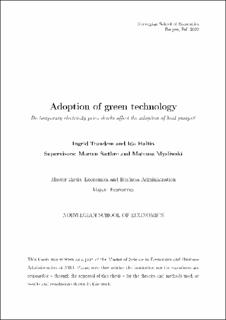Adoption of green technology : Do temporary electricity price shocks affect the adoption of heat pumps?
Master thesis
Permanent lenke
https://hdl.handle.net/11250/3052789Utgivelsesdato
2022Metadata
Vis full innførselSamlinger
- Master Thesis [4372]
Sammendrag
In this thesis, we aim to explore if temporary electricity price shocks affect adoption of
heat pumps. In order to do this we construct panel data by combining sources from
Enova and NordPool on number of subsidized heat pump installations and electricity
spot prices for the different price areas in Norway. We then estimate a least square
dummy variable regression with price area, yearly and monthly fixed effects to see whether
fluctuations in average lagged electricity prices spur adoption of heat pumps. In addition,
we use data from the Norwegian center for research data (NSD) to have a closer look at
which household characteristics that correlate with the prevalence of heat pumps. In the
interpretation of our results we rely on the theoretical underpinnings of bounded rational
consumer behavior, with focus on myopic expectations and inattention.
Despite the temporary nature of the increases in the electricity price in our observations,
we find that an average increase in the electricity price of one percent over the last four
months leads to a significant increase in installations of 1.12 percent. Thus, we argue that
temporary electricity price shocks indeed do affect households adoption of heat pumps.
One explanation for our results is that consumers are myopic to the electricity price,
adjusting their future price expectations as a result of the increase in the current electricity
price. Another explanation is that temporary price shocks increases households attention,
inducing information acquisition on energy efficient technology to dampen the costs of
the next price increase.
Our results from NSD suggest that larger households living in an owner-occupied detached
house are most frequent to have a heat pump installed. Even though these characteristics
are likely to prevail for the Norwegian population as a whole, it might not be valid for the
data provided by Enova due to the high up-front cost of subsidized heat pumps.
